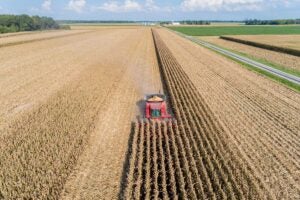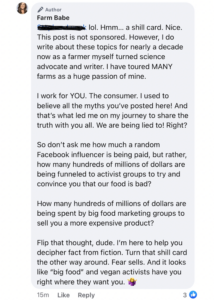Now that I got your attention with a wildly nonsensical “clickbait” sort of headline, let’s clarify. A lot of the “shill” arguments are just like that: nonsensical clickbait.
When I started the “Farm Babe” on social media nearly a decade ago, a lot of my “claim to fame” type viral posts were on debunking myths around GMOs. When I started sharing information that they were a good thing, anti-GMO activists came out in droves, accusing me of getting some sort of kickbacks from the company.
No, I wasn’t a Monsanto shill, and I’m not a “shill” for any company today. Too many people don’t even realize that the “big bad Monsanto” doesn’t really even exist anymore, as they were purchased by Bayer in 2018. In the meantime, however, on our farm we were growing Monsanto GMOs and had been for years. So when they’d ask me if I was paid by Monsanto, my answer was simple: “Monsanto doesn’t pay me. We pay them.” We were choosing to purchase Monsanto products because they worked. That’s how this whole “farming” thing works.
The ironic part about this is the anti-Monsanto or anti-GMO campaigns are very well funded and often publicly announce their shill campaigns. Here is a response I had to a follower who asked me the (quite boring and over-used) “how much do they pay you” question:
Why is Bayer/Monsanto a big company? They sell products that work, so farmers choose to purchase them. And over the years, I became particularly fascinated by the “anti-Monsanto” movement. Also fascinated by the fact that I’ve never actually met a commercial scale farmer who doesn’t like Bayer/Monsanto. I even wrote an article about that fact here.
I was learning about — and inspired by — the technology that was helping solve some of agriculture’s biggest problems. And they’re not the only biotech company. Many other companies out there are also creating beautiful solutions, whether that means using chemistry, machinery, or other precision tools.
And if you look at the actual history of Monsanto, in the 1990s, there was a much greater focus on seeds. Perhaps that reputation of its Vietnam War-era Agent Orange just won’t die. The good news is many of the chemicals from decades past are no longer available or have been phased out, while better, more specific, and safer products have replaced chemistries from before. Just as with everything in life, technology and research will continue to produce better and safer products with time. Business models evolve. People are living longer than ever before.

Anyway, back to the title of this article. As I’ve gotten more intrigued by seed chemistry and technology, Bayer has hired me to speak at some of their events and host some round table discussions where I have learned so much. I get to interview scientists, farmers, and other experts for an upcoming video series called The Intersect, where I’m continually impressed with what I learn. And just want to share it!
That’s what is so cool about it. Bayer has over 100,000 employees. People working hard to actually make the world a better place. It’s not a conspiracy, it’s not a big, bad, evil corporation. It’s literally people who care, and work hard to make better plants that farmers want. The employees of Bayer are parents, siblings, spouses and friends, just like the rest of us.
For the record, I’m not being paid by Bayer to write this article (though I am paid my weekly columnist fee by AGDAILY), and, to reiterate, the headline of this is satire. But when it comes to learning about anything in life, isn’t it always best to go to the source? We talk to our dentist about our teeth; our mechanic about our car. Doesn’t it make sense to talk to scientists who study plants, to learn about what they’re doing to science and plants? It’s just common sense, right? That is why I don’t mind visiting with people within their company. If you want to learn more about GMOs, for example, I recommend checking out GMOanswers.com or Bayer.com (again, NOT sponsored.)
In general, a lot of people just need to keep an open mind. Whenever we are skeptical, that’s OK! But give yourself a opportunity to learn something new. It just might change your mind and perspective for the better. I know it has for me.
Michelle Miller, the “Farm Babe,” is an internationally recognized keynote speaker, writer, and social media influencer and travels full time to advocate for agriculture. She comes from an Iowa-based row crop and livestock farming background and now resides on a timber farm in North Central Florida.




